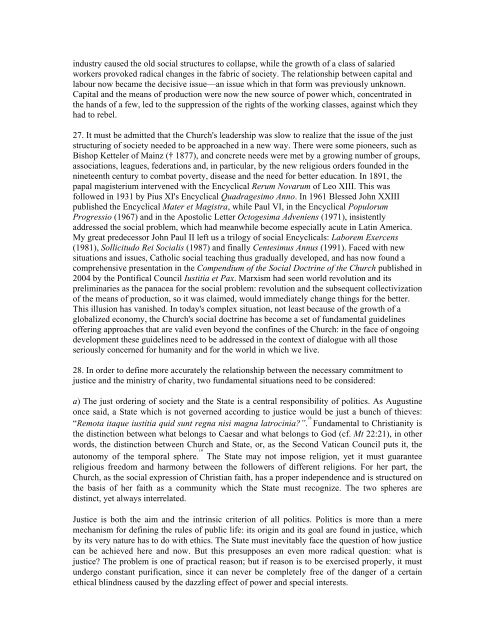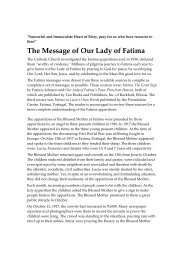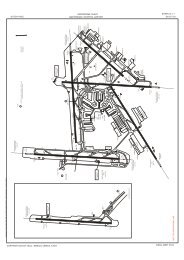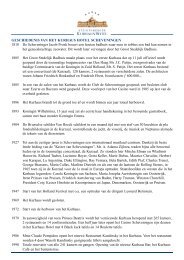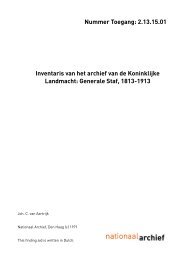God Is Love - Beeldbibliotheek
God Is Love - Beeldbibliotheek
God Is Love - Beeldbibliotheek
- No tags were found...
Create successful ePaper yourself
Turn your PDF publications into a flip-book with our unique Google optimized e-Paper software.
industry caused the old social structures to collapse, while the growth of a class of salariedworkers provoked radical changes in the fabric of society. The relationship between capital andlabour now became the decisive issue—an issue which in that form was previously unknown.Capital and the means of production were now the new source of power which, concentrated inthe hands of a few, led to the suppression of the rights of the working classes, against which theyhad to rebel.27. It must be admitted that the Church's leadership was slow to realize that the issue of the juststructuring of society needed to be approached in a new way. There were some pioneers, such asBishop Ketteler of Mainz († 1877), and concrete needs were met by a growing number of groups,associations, leagues, federations and, in particular, by the new religious orders founded in thenineteenth century to combat poverty, disease and the need for better education. In 1891, thepapal magisterium intervened with the Encyclical Rerum Novarum of Leo XIII. This wasfollowed in 1931 by Pius XI's Encyclical Quadragesimo Anno. In 1961 Blessed John XXIIIpublished the Encyclical Mater et Magistra, while Paul VI, in the Encyclical PopulorumProgressio (1967) and in the Apostolic Letter Octogesima Adveniens (1971), insistentlyaddressed the social problem, which had meanwhile become especially acute in Latin America.My great predecessor John Paul II left us a trilogy of social Encyclicals: Laborem Exercens(1981), Sollicitudo Rei Socialis (1987) and finally Centesimus Annus (1991). Faced with newsituations and issues, Catholic social teaching thus gradually developed, and has now found acomprehensive presentation in the Compendium of the Social Doctrine of the Church published in2004 by the Pontifical Council Iustitia et Pax. Marxism had seen world revolution and itspreliminaries as the panacea for the social problem: revolution and the subsequent collectivizationof the means of production, so it was claimed, would immediately change things for the better.This illusion has vanished. In today's complex situation, not least because of the growth of aglobalized economy, the Church's social doctrine has become a set of fundamental guidelinesoffering approaches that are valid even beyond the confines of the Church: in the face of ongoingdevelopment these guidelines need to be addressed in the context of dialogue with all thoseseriously concerned for humanity and for the world in which we live.28. In order to define more accurately the relationship between the necessary commitment tojustice and the ministry of charity, two fundamental situations need to be considered:a) The just ordering of society and the State is a central responsibility of politics. As Augustineonce said, a State which is not governed according to justice would be just a bunch of thieves:“Remota itaque iustitia quid sunt regna nisi magna latrocinia?”. 18 Fundamental to Christianity isthe distinction between what belongs to Caesar and what belongs to <strong>God</strong> (cf. Mt 22:21), in otherwords, the distinction between Church and State, or, as the Second Vatican Council puts it, theautonomy of the temporal sphere. 19The State may not impose religion, yet it must guaranteereligious freedom and harmony between the followers of different religions. For her part, theChurch, as the social expression of Christian faith, has a proper independence and is structured onthe basis of her faith as a community which the State must recognize. The two spheres aredistinct, yet always interrelated.Justice is both the aim and the intrinsic criterion of all politics. Politics is more than a meremechanism for defining the rules of public life: its origin and its goal are found in justice, whichby its very nature has to do with ethics. The State must inevitably face the question of how justicecan be achieved here and now. But this presupposes an even more radical question: what isjustice? The problem is one of practical reason; but if reason is to be exercised properly, it mustundergo constant purification, since it can never be completely free of the danger of a certainethical blindness caused by the dazzling effect of power and special interests.


